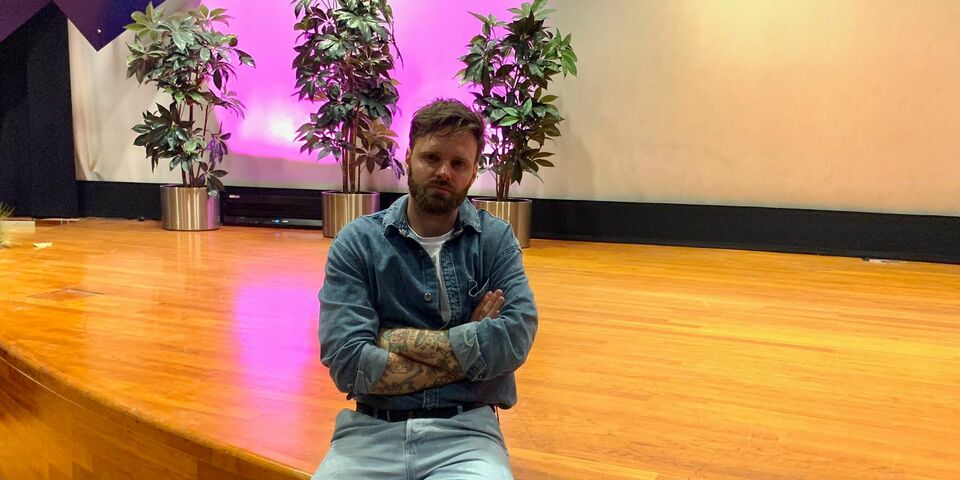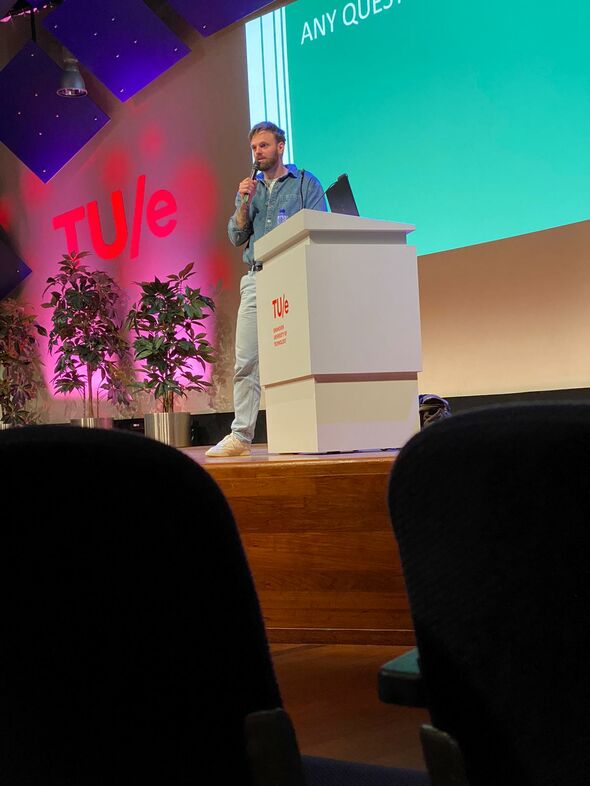Tim Hofman: “Don't point at the victims, but educate your men”
Tim Hofman, known to Dutch students as 'the man behind online show BOOS' and 'he who revealed abuse within the Voice'. Probably that’s why the Blauwe Zaal was filled with mostly Dutch students Thursday afternoon when Hofman gave a lecture for the MyFuture Week. He talked about what life has thrown at him, the three studies that cost him 40,000 euros but yielded zero diplomas and how that isn’t even that bad. He also had a clear message about social safety: do not point at the victims and how they should report things, but first educate the perpetrators. And he calls them by name: white men in positions of power.
A long line in front of the Blauwe Zaal well before the start of Hofman's lecture shows that he is popular. Mainly among Dutch people, though, the internationals can be counted on one hand even though the lecture is in English. The program maker jokes about a PowerPoint slide with an overview of his university studies: three in total. Impressive. But he didn't finish any of them. “Whatever you do, don't choose Communication Sciences. I still don't know exactly what I was doing there. The three studies left me with a debt of 40,000 euros. I have completed one course in four years and received 7.5 credits for it. A fairly expensive course, I’d say.”
Still, he is not unhappy with where he is now and is happy to share the troubles with the students. “I suffered from loneliness, depression and low self-esteem. Of course that didn't help me.” He looks into the hall. “Who here ever feels depressed? After a repetition of the question, around thirty to forty hands go up cautiously, of about 250 students.
Calling off wedding
Hofman continues: “I was a hypochondriac (I still am a bit), failed often and was also engaged to the wrong person. In all those years that I kept failing in my studies, I never told my parents that I didn’t want to continue studying, afraid of their reaction. After four years I decided to call them after all: I'm going to stop studying. There was a moment of silence, but then they responded in an unexpected relaxed manner: 'Alright, we were already wondering why you were still in university. Go do something you like.'” A weight fell off his shoulders. He called off the wedding, left his girlfriend and felt relieved and free. “It was very difficult to do all this, but had I let fear guide me I would be a married man right now with three children. I am still glad that I made these decisions then.” He has some simple tips for the students if they feel insecure or afraid whether they are doing things right:
- Don't judge your emotions, otherwise you will feel bad twice. If you're going to feel bad about feeling bad, it won't help;
- You can think about everything, but don't feed every idea. Especially if you're a hypochondriac;
- Treat yourself like your best friend. We are often much kinder and more compassionate to others than we are to ourselves;
- Dare to focus, you don't have to do everything. You may choose. The biggest challenge in today's society is getting enough rest;
- Dare to fail, it won't kill you.
BOOS
Most of the lecture focuses on his life in his twenties, as a student. But of course he can't avoid talking to the audience about his online show BOOS, which he doesn't mind. There are plenty of questions from the audience. Whether he ever receives death threats (yes, just yesterday), and whether he is not afraid of polarizing. “No, what I'm doing is not polarizing, I'm trying to make power systems more equal. What Rosa Parks (civil rights activist, ed.) did was not polarizing but fighting for her rights. What Geert Wilders does is polarization, fighting for equal rights is not. I give people without a voice a voice, people who are not seen a face.”
Don't be afraid of powerful people
Hofman also thinks it is important to continue to address people in positions of power about their behavior, as he did in the interview with John de Mol, the Talpa boss responsible for TV show The Voice. “Just say what you want to say, even when you're dealing with people with a lot of power. I've never let them stop me asking tough questions. You don't have to be friends with them. And don't let them tell you that you're not smart enough or don't know how it works.”
Feeling socially unsafe at the university
“Put stickers around uni” is how Hofman recommends to start educating men better and pointing the finger less at the victims. A prelude to a text: 'men, don't touch women if they don't want to be touched'. Hofman is not surprised that social unsafety, abuse of power and sexually undesirable behavior also play a role at the university. He does think that we should stay away from focusing on how the victims should 'report' cases. “You also saw that with John de Mol at the time of The Voice. He said 'why didn't those women report it'. That's not the point. Educate your men. And that's not a sensitive thing to say. It's just mostly white men in positions of power. And stopping sexism is therefore a responsibility of men. And as far as reporting is concerned, that should not be done via the person who is the problem.”



Discussion